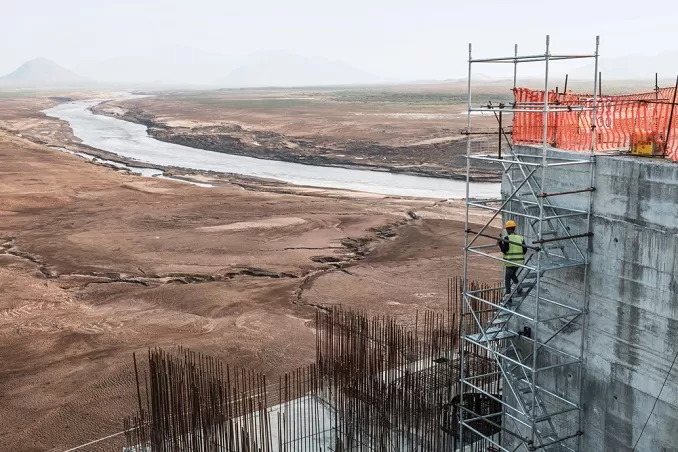

ethiopia denies that the nile mega dam will starve egypt and sudan
![]()
![]()
Sunday’s events were termed by Abiy as “the dawn of a new era.” On Twitter, he remarked, “This is fantastic news for our continent and the downstream countries with which we aspire to collaborate.” Addis Ababa sees the project as critical to the electricity and development of Africa’s second-largest country, while Cairo and Khartoum are concerned that it could jeopardize their access to critical Nile resources. As he looked at the site, Abiy brushed off those fears by wearing sunglasses and a khaki-colored hat with the Ethiopian flag on it.
As water surged through the concrete colossus behind him, he stated, “As you can see, this water will generate energy while flowing to Sudan and Egypt, contrary to rumors that the Ethiopian people and government are damming the water to starve Sudan and Egypt.” It was also slammed by Cairo, which said that Ethiopia was “persisting in its violations” of a 2015 agreement signed by the three countries.
The $4.2-billion (3.7-billion-euro) dam will eventually provide more than 5,000 megawatts of power, more than tripling Ethiopia’s current output. Only one of the 13 turbines, with a total installed capacity of 375 megawatts, is now functioning. A second will be operational in a few months, according to project manager Kifle Horo, who also stated that the dam will be completed in 2024. The 145-meter (475-foot) high structure straddles the Blue Nile in western Ethiopia’s Benishangul-Gumuz area, close to the Sudanese border.
Egypt, which relies on the Nile for 97 percent of its agricultural and drinking water, faces an existential threat from the dam.Sudan expects the project will help regulate annual flooding, but it is concerned that if the GERD’s functioning is not agreed upon, its own dams may be affected. Both have long pushed for a binding agreement on the dam’s filling and operation, but African Union-sponsored talks have yet to yield a breakthrough. The GERD is seen as a symbol of Ethiopia’s resistance to outside pressure, says William Davison, a senior analyst at the International Crisis Group.
Because the government has promoted the idea that foreign players are attempting to undermine Ethiopia’s sovereignty, I believe this will be interpreted as demonstrating that they are still making progress in the face of a hostile environment. After 15 months of deadly conflict with Tigrayan rebels, Addisu Lashitew of the Brookings Institution in Washington said the GERD’s commissioning was a “rare positive development that can unite a severely split country.” “The GERD’s freshly generated electricity might help revitalize an economy that has been decimated by a terrible war, rising fuel prices, and the COVID-19 outbreak,” he said.
Former Prime Minister Meles Zenawi, a Tigrayan politician who ruled Ethiopia for more than two decades until his death in 2012, was responsible for the dam’s construction. In the year of the project’s start, civil servants donated one month’s salary, and the government has since issued dam bonds aimed at Ethiopians at home and abroad. Officials credited Abiy with restoring the dam on Sunday, claiming that mismanagement had slowed its progress. Kifle, the project manager, said at the ceremony: “Our country has lost so much because the dam was not built on time, especially in terms of money.”
Ethiopia said in July of that year that it had met its objective of 4.9 billion cubic metres, and the process of filling the GERD’s huge reservoir began in 2020. The reservoir’s entire capacity is 74 billion cubic meters, with a 13.5 billion-cubic-meter addition planned for 2021. Ethiopia announced in July that it had met that goal, indicating that there was enough water to begin producing energy, despite the fact that other experts questioned the assertions. Kifle refused to say how much water was gathered last year or what the goal for this year’s rainy season is.
Two mobile telecom leaders, MTN Group and Airtel Africa, joined forces to create a new digital infrastructure system throughout African…
South African President Cyril Ramaphosa defended his nation against claims of white discrimination made by tech magnate Elon Musk. After…
Hilton launched Signia by Hilton for its first appearance in Egypt and Africa through its hotel expansions. These hotels at…
UNICEF reported that, nearly 2900 people died of cholera across Eastern and Southern African countries while children suffer most greatly…
Enza, based in the United Arab Emirates, obtained $6.75 million in initial investment funding from Algebra Ventures and Quona Capital.…
US Secretary of State Marco Rubio ordered South African Ambassador Ebrahim Rasool to leave America by March 21 because he…
This website uses cookies.